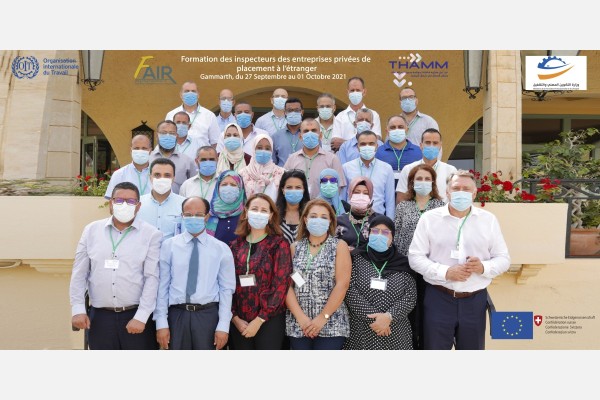Repository of Practices

Tunisia – Formation of a new body of inspectors for the recruitment industry
Secondary GCM Objectives
Dates
Type of practice
Summary
In 2017, the ILO conducted a “Diagnostic on the processes of worker recruitment in Tunisia”. The Diagnostic, which had been prompted by concern for Tunisian workers who had faced recruitment irregularities in the Kingdom of Saudi Arabia (KSA), issued a number of recommendations towards improving labour recruitment processes for Tunisians seeking to work abroad. One of these recommendations called for legislative reform. A tripartite committee was convened by the ILO to consider the reform, and submitted, in 2019, the “Law on the organisation of the exercise of the activities of placement of Tunisians abroad by private agencies” (or Recruitment Law), which was approved by the Council of Ministers on 8 May 2019. The new law extends the State’s authority to deliver sanctions to recruitment agencies that do not comply with defined operational and procedural standards. The Ministry of Labour then approved the formation of a new inspectorate, to monitor and enforce the implementation of the Recruitment Law. A job description was accordingly defined and validated by relevant ministries. With ILO’s support, the Ministry of Labour then developed comprehensive guidance and tools to equip the new inspectorate, and a training program to build its capacity.
Organizations
Main Implementing Organization(s)
Partner/Donor Organizations
Benefit and Impact
• Strengthened legislation extending the state’s authority to regulate the activities of private recruitment agencies. Article 13 of the Recruitment Law clearly mentions that it is forbidden for private recruitment agencies to receive – directly or indirectly – any financial payments from prospective migrant workers; Article 11 of the Law spells out the essential elements that must be clearly mentioned in any employment contract;
• The creation of an inspectorate specifically dedicated to inspecting private recruitment agencies placing Tunisians abroad with a view to ensuring fair recruitment. Importantly, the new inspection unit has the authority to issue dissuasive sanctions against recruiters who commit irregularities/break the law;
• The Office of Emigration and Foreign Manpower has become a general directorate and several private employment agencies have submitted their files to the ministry to regularize their status.
The newly created inspection body is specifically geared towards monitoring private recruitment agencies, and has been given the authority to issue a range of sanctions, which gives it extra-ordinary powers to ensure compliance with the new Recruitment Law and principles of fair recruitment.
Several tools have been developed to support the capacity of this new inspection body:
- A self-evaluation checklist to enable inspectors to evaluate their competencies in 7 areas
- A standardised inspection process tool, enabling each inspector to carry out their inspection in a structured and sequential manner by pointing out all the checks to be carried out.
- An “inspectors booklet” bringing together all relevant training materials and aims to provide future inspectors without initial training, with theoretical and practical knowledge
- A guide on good inspection practices, which outlines the unified methodological approach to be taken during inspection visits, in line with the legislation and national and international regulations.
Key Lessons
It was necessary to develop a process/tool to centralise the inspection reports at central level for review and collection by the relevant directorate, to ensure cases and complaints could be followed-up, and to generate pertinent statistics.
Recommendations(if the practice is to be replicated)
The materials and training for labour inspectors should be regularly reviewed as operational systems are updated and as prioritise evolve and change.
ILO Nepal is considering dialogue with national stakeholders in view of replicating the Tunisian practice, and other countries may follow suit.
Innovation
Additional Resources
Date submitted:
Disclaimer: The content of this practice reflects the views of the implementers and does not necessarily reflect the views of the United Nations, the United Nations Network on Migration, and its members.
More Related Practices:
- Recruitment Cost Calculator (RCC)
- Research on human rights violations against live-in domestic workers, and related Code of Good Practice
- Migration Lab for the domestic and home care sector
- Domestic Workers League of ACV-CSC Brussels
- Ferias y actividades multitudinarias vinculadas a trabajo con organizaciones de base
Peer Reviewer Feedback:
*References to Kosovo shall be understood to be in the context of United Nations Security Council resolution 1244 (1999).
Newsletter
Subscribe to our newsletter.